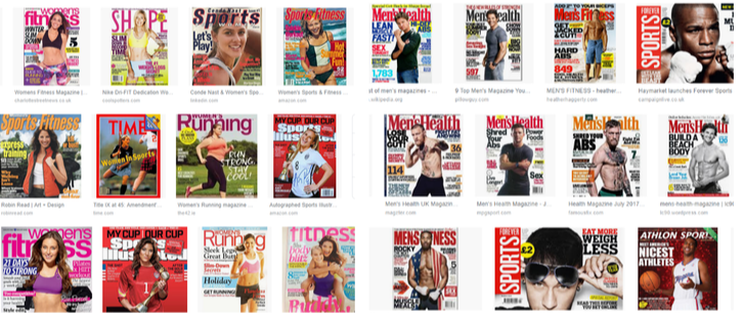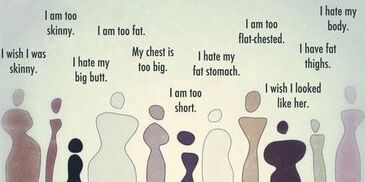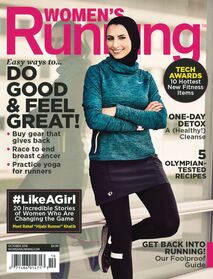AuthorA 20 year old fitness enthusiast and dedicated Olympic style weightlifter. I am a Level 2 Weightlifting coach, Powerlifter, and non-competitive Irish dancer. I'm determined to live a healthier lifestyle and take care of my body whilst influencing other young people to do so. I never doubt my ability to achieve something; I just change what I'm doing until I succeed. Archives
May 2021
|
Back to Blog
Body shaming: Why do we do it?19/7/2019 About two years ago, I wrote a blog post all about body confidence. The blog post is what I wanted it to be and all, but I felt as if it would be nicer to establish why we consciously and unconsciously body shame and the general impacts of this. I thought that some ties into some other great sites would be a method of empowerment through such a deep-subject post. Here is the link to that post if you would like to read it. What is body shaming?Body shaming can involved you as an individual looking at your own body in a negative way, through comparisons to others like your friends, role models, family members and celebrities. Body shaming can also involve you or a group of people having an negative opinion about another persons body. Body shaming can be presented as conscious or unconscious. For example: Conscious body shaming: This involves the idea that shaming another persons body is noticeable, verbal and specifically targeted at an individual. This may appear as attempted humour, but can actually be classed as a form of bullying. For example, making negative comments about a persons weight loss or weight gain. Unconscious body shaming: This involves the idea that we have thoughts about body shaming ourselves or others, but these are either suppressed or not verbally spoken. For example, walking past someone and thinking that they 'don't suit the revealing clothes they are wearing' or are 'showing too much skin'. When does body shaming happen? I felt that within this section I should highlight that body shaming happens everywhere. It doesn't matter what culture you are from, your gender, your economic status or your everyday environment. Particularly within this post, I am going to focus upon body shaming within the sports industry and a recent experience of mine involving body shaming. Take a look at the Women's and Men's front covers of sports magazines. Here are some of the similarities and differences that I have noticed.
Women Magazine Observations I have noticed that there are at least 4/12 of the sample of magazine covers for Women that show Women as 'long-term sportswomen' and not just 'women going to the gym as a new hobby'. These same images portrays them as a body type that isn't overly associated with being 'healthy' or shows them holding trophies achieved from their sport. Although this is a very small number, this I like! Those four images don't sexualise the nature of Women participating in sports for someone else's enjoyment. The following words were featured on the front of this small sample of the Women's Sports magazines. Fat blasters, Look hot, Look 5 years younger, Sleek sexy arms, World-Class Butt, Slim-down secrets, Diets, Super Fun Salads! Male Magazine Observations Within the Male magazine sample, it only seems to show 4/11 men within normal fitness clothes that they would wear to the gym. I don't know of many men who would go to the gym or play their sport topless? but anyways. Again, it doesn't seem to show any body types other than 'muscular types'. Sorry but since when is someone wearing sunglasses and 'looking cool' associated with sports? It is quite possible that the male sportspeople on the front of these magazines are athletes (Michael Jordan and Conor Mcgregor), but using male actors could start to put pressure upon the ideas that even actors who just 'go to the gym' have the best bodies. Therefore, this starts to build up a reputation surrounding the idea that all men must have muscular or 'fit' bodies. There are only 2/11 covers within the sample that don't have unrealistic images of men who just 'go to the gym' or 'get all the women'. Meaning these images contained athletes without their bodies being the main focus of the shot for another persons enjoyment. The following words were featured on the front of this small sample of the Men's Sports magazines. Hi-Def Abs, Strip away belly fat, Power foods for men, Big arms now, Look better instantly, Add 2" to your biceps, Get jacked, Hard abs, Build a beach body, Weigh less Eat More! The impacts of body shaming From shethepeople.tv From shethepeople.tv I figured I would observe the words surrounding the magazine covers and I can report back that at least nearly half of the Males sports magazines contained sexual references. Now, I know my target audience is pretty young for this site, but: wheres the need? Its a sports magazine and shouldn't broadcast and force such imagery surrounding the topic to both genders. Not mention that there is a lack in any form of 'young peoples sporting magazines and articles'. Do the people writing these covers even think about the low self-esteem issues it could project onto some Men. I think its pretty safe to say that both Male and Female sports magazines are just as sexualised as each other! Then, this causes those who may have different body types to the models on the cover to feel insecure. I mean, if you are not happy with your body; then do something about it! But pressurised imagery and wording from a magazine should not force an individual to change how they look, if they like their body anyways. Can you imagine how a person may feel if their physical traits that they are perfectly comfortable with are being broadcasted as 'awful' and 'avoidable' throughout the media? I mean, no wonder we all tend to jump on the bandwagon of unconsciously body shaming ourselves and others! How this should change? A women wearing a hijab was placed upon the front cover of an American Sports Magazine, 2016. A women wearing a hijab was placed upon the front cover of an American Sports Magazine, 2016. There seems to be a specific 'look' when it comes to what 'body type' is on the front cover of a magazine. Thankfully, some magazines are starting to make a breakthrough with this. Making a difference should involve the usage of body types such as using people who are not models and who are comfortable in their body or those who have just tackled major long-term fitness goals of theirs. Groups of different genders, body types, ages and cultures should be broadcasted on sports magazines just as much as any other magazine or platform. Ideally, if I was going to design my own varieties of sporting magazine covers, they would contain: Models: Young athletes, elderly athletes, athletes of all abilities, child athletes and talented people, female and male athletes who aren't half-naked on the cover together. The cover of a sporting magazine should look equal Words: Empowering words about the individuals on the cover WITHOUT comparing them to the reader, phrases that suggest there is a choice revolving around a person's body type and fitness levels, phrases that are not sexualised or aimed towards gender stereotypes. Why should this change?Obviously the images on the covers of magazines are what helps to sell the magazine, therefore what has sold before will sell again. So if the cycle slowly starts to break, it may be possible that parents will buy their children positive and uplifting magazines featuring inspiring and talented people next to normal and regular sportspeople. I mean, body shaming is happening all around us! Social media is all around us! It is not too often that I experience body shaming nowadays. I used to get slight hints towards it when I was younger. That I should be lucky that I'm so skinny, which wasn't a particular feature I desired within myself, which made me think when I was growing that I had to remain skinny. More recently, because I'm on the skinnier side of your average stocky ideal Olympic Weightlifter, I get some comments online and in person about my size. For example, 'Do you even lift' or 'Hey do you know which muscle you need to build stronger and bigger?' (No because I hadn't thought about that until you mentioned it). More recently, an adult actually asked me to flex my arms as they thought I looked 'too skinny to lift weights'. I so badly wanted to explain that Olympic Weightlifters don't have predominant biceps, I'm a small Woman so I'm not going to have massive amounts of muscle mass and that I don't take performing enhancing drugs. If there are people on PED's on the cover of magazines, then that makes everything so much worse. So is it that the media has projected these poor ideas onto us that even amateur sports players are being body shamed for not looking particularly athletic? It's not even just athletic people. If you're skinny, you should bulk up. If you're classed as overweight, you should cut down. It's becoming nasty and is effecting the younger minds of this day and age. This causes bullying and mental ill health. I mean obviously if you're in a critical health situation with your body size, then seek help by all means. If that is by fault of the media, then shame on them! I found two interesting article links about this topic. Please have a read here, I backs up many of my points made. More recently I have bought a book called 'Goodnight stories for Rebel Girls' and there is another book called 'Goodnight stories for Rebel Boys' too. These are excellent books to inspire all. I recommend them entirely. Thank you for reading this post!
0 Comments
Read More
Your comment will be posted after it is approved.
Leave a Reply. |